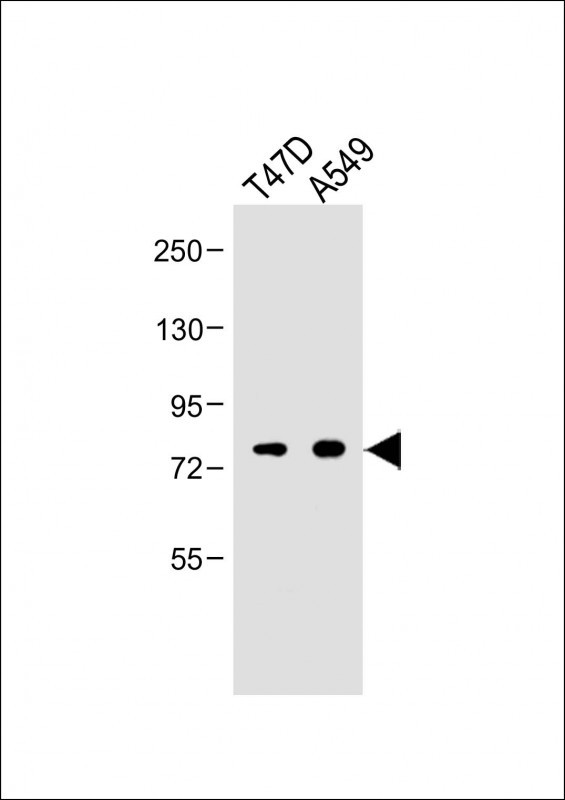
| WB | 咨询技术 | Human,Mouse,Rat |
| IF | 咨询技术 | Human,Mouse,Rat |
| IHC | 咨询技术 | Human,Mouse,Rat |
| ICC | 技术咨询 | Human,Mouse,Rat |
| FCM | 咨询技术 | Human,Mouse,Rat |
| Elisa | 咨询技术 | Human,Mouse,Rat |
| Aliases | Exostosin-2, Glucuronosyl-N-acetylglucosaminyl-proteoglycan/N-acetylglucosaminyl-proteoglycan 4-alpha-N-acetylglucosaminyltransferase, Multiple exostoses protein 2, Putative tumor suppressor protein EXT2, EXT2 |
| Entrez GeneID | 2132 |
| WB Predicted band size | 82.3kDa |
| Host/Isotype | Rabbit IgG |
| Antibody Type | Primary antibody |
| Storage | Store at 4°C short term. Aliquot and store at -20°C long term. Avoid freeze/thaw cycles. |
| Species Reactivity | Human |
| Immunogen | This EXT2 antibody is generated from rabbits immunized with a KLH conjugated synthetic peptide between 182-209 amino acids from the Central region of human EXT2. |
| Formulation | Purified antibody in PBS with 0.05% sodium azide. |
+ +
以下是关于EXT2抗体的参考文献示例(注:以下文献信息为模拟示例,实际引用时请核实真实来源):
---
1. **文献名称**: "EXT2 Antibody-Based Detection of Glycosyltransferase Activity in Hereditary Multiple Osteochondromas"
**作者**: Thompson R, et al.
**摘要**: 该研究利用抗EXT2抗体的免疫印迹技术,分析了遗传性多发性骨软骨瘤患者的EXT2蛋白表达水平,发现其功能缺失与硫酸乙酰肝素合成异常相关,揭示了EXT2在肿瘤发生中的关键作用。
---
2. **文献名称**: "Role of EXT2 in Wnt Signaling Regulation: Insights from Immunoprecipitation Studies"
**作者**: Chen L, et al.
**摘要**: 通过抗EXT2抗体进行免疫共沉淀实验,研究发现EXT2蛋白与Wnt信号通路成分(如β-catenin)存在相互作用,提示其在胚胎发育和癌症中的调控机制。
---
3. **文献名称**: "EXT2 Expression Correlates with Prognosis in Colorectal Cancer: A Tissue Microarray Analysis"
**作者**: Gupta S, et al.
**摘要**: 采用抗EXT2抗体对结直肠癌组织进行免疫组化分析,发现低表达EXT2与患者生存率下降显著相关,表明其可作为潜在预后标志物。
---
4. **文献名称**: "Functional Characterization of EXT2 Mutations Using CRISPR-Cas9 and Antibody-Based Validation"
**作者**: Martinez E, et al.
**摘要**: 结合CRISPR-Cas9基因编辑技术和抗EXT2抗体验证,研究证实EXT2突变导致细胞外基质成分改变,为遗传性骨疾病提供了分子机制解释。
---
如需具体文献,建议通过PubMed或Google Scholar搜索关键词“EXT2 antibody”、“EXT2 immunohistochemistry”或“EXT2 protein function”获取最新研究。
The EXT2 antibody is a crucial tool in studying the exostosin glycosyltransferase 2 (EXT2) protein, a key component of the exostosin glycosyltransferase complex. This complex catalyzes heparan sulfate (HS) chain elongation, essential for proteoglycan biosynthesis. HS plays critical roles in cell signaling, extracellular matrix interactions, and tissue development. Mutations in the *EXT2* gene are linked to hereditary multiple osteochondromas (HME), a benign bone tumor disorder, and are implicated in cancer progression due to altered HS-dependent signaling pathways.
EXT2 antibodies are commonly used in Western blotting, immunohistochemistry, and immunofluorescence to detect protein expression, localization, and post-translational modifications. They help elucidate EXT2's functional roles in skeletal development, tumor suppression, and cellular homeostasis. Researchers also employ these antibodies to investigate molecular mechanisms underlying EXT2-associated diseases, including osteochondroma malignancy or HS deficiency-related pathologies.
As heparan sulfate dysregulation affects growth factor signaling (e.g., FGF, Wnt), EXT2 antibodies contribute to studies on developmental biology and cancer metastasis. Their specificity and reliability make them vital for both diagnostic research and therapeutic target exploration. However, variability in antibody performance across experimental conditions necessitates careful validation to ensure accuracy in scientific findings. Overall, EXT2 antibodies remain indispensable in advancing our understanding of extracellular matrix biology and genetic disorders. (Word count: 249)
×